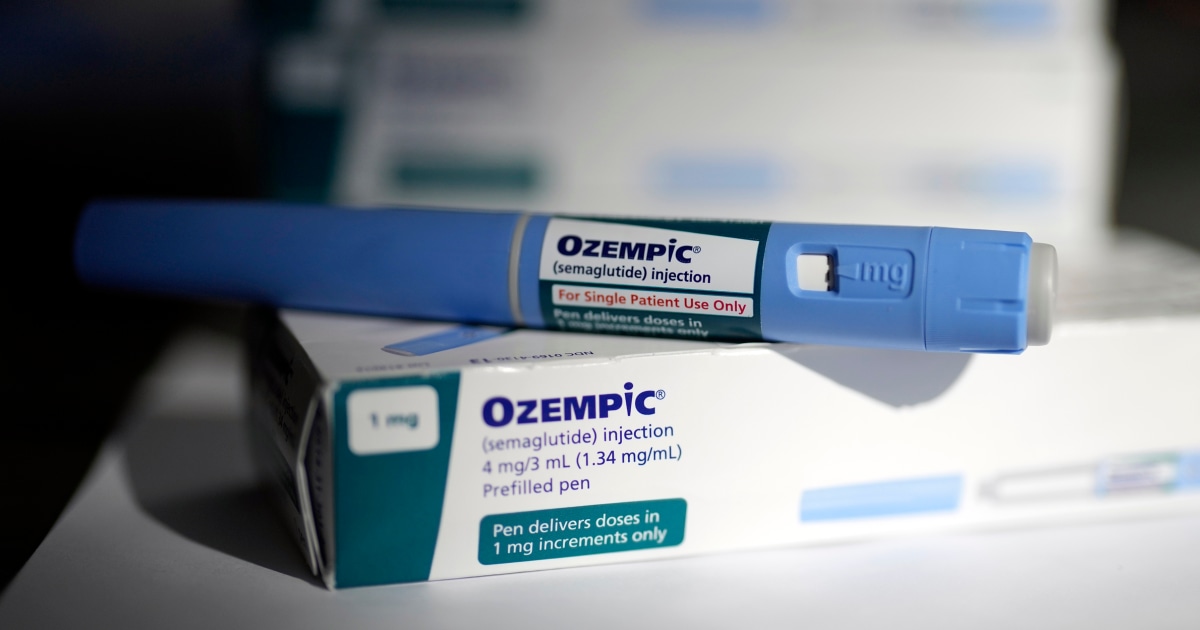Health agencies in the United States and Europe say there is no evidence that thoughts of suicide or self-injury are linked to the popular diabetes and weight-loss drug semaglutide, which is sold under the brand names Ozempic and Wegovy.
Following a nine-month review, the European Medicines Agency concluded Friday that “the available evidence does not support a causal association” between GLP-1 receptor agonists, the class of drugs that includes semaglutide, and suicidal thoughts or actions. .
The Food and Drug Administration (FDA) reached a similar conclusion in January. The agency reviewed reports of suicidal thoughts or actions submitted to its adverse event reporting system, but a preliminary review concluded there was no clear relationship with the use of GLP-1 receptor agonists. However, the FDA said in a statement that it “cannot definitively rule out that a small risk may exist” and that it would continue to study the issue.
As semaglutide gained popularity last year, a small number of users reported suicidal thoughts while taking it.
Until December 2023, the FDA adverse event reporting system had received 157 reports of suicidal thoughts attributed to Ozempic and 18 attributed to Wegovy. By comparison, more than 2.6 million people in the United States were prescribed semaglutide from January 2018 to September 2023, according to data provided to NBC News by Epic Research, a health analytics firm.
“I don't think we can say that the issue is completely closed, but the evidence we have so far is reassuring,” said Dr. Eduardo Grunvald, a physician specializing in Obesity Medicine at UC San Diego Health. Grunvald is a consultant for Novo Nordisk, maker of Ozempic and Wegovy, but did not speak on behalf of the company.
Novo Nordisk told NBC News that it “stands behind the safety and effectiveness” of its GLP-1 medications when used correctly and under the supervision of a licensed healthcare professional. The company indicated that will continue to monitor reports of adverse reactionsincluding suicide and suicidal thoughts.
“We look forward to working with the FDA to complete its review,” the company said in a statement.
The FDA approved Wegovy for weight loss in 2021. The agency requires any weight control medication that acts on the central nervous system to carry a warning about suicidal thoughts. Ozempic, a different dose of semaglutide, does not carry such a warning because it is only approved to treat type 2 diabetes, although some doctors prescribe it for weight loss.
In clinical trials, semaglutide significantly reduced blood sugar levels and body weight in 15% of people.
“Overall, it is clear thatThe benefits are winning the race over the risks in these drugs,” Grunvald said.
A Nature Medicine study in January found that people taking semaglutide were up to 73% less likely to have suicidal thoughts than those taking other weight loss or diabetes medications.
The study analyzed the medical records of nearly 1.6 million patients with type 2 diabetes and more than 240,000 patients with obesity. One particular analysis followed two groups, each containing about 53,000 patients who were obese or overweight but without a history of suicidal thoughts. The first group was prescribed semaglutide, while the second was prescribed anti-obesity drugs that were not GLP-1 receptor agonists. After about six months, no one in the semaglutide group had reported a suicide attemptwhile 14 people from the other group did.
The trend was similar for people with a history of suicidal thoughts who were overweight or obese, as well as for those taking semaglutide for type 2 diabetes.
“We saw a lower risk associated with semaglutide compared to other medications, but we still don't know exactly the mechanism,” said Rong Xu, study author and professor of Biomedical Informatics at Case Western Reserve University.
“We are not saying that the risk is zero,” he added. “We just compared it to other medications and didn't see an increase.”
Doctors who regularly prescribe semaglutide say there may be other reasons why patients taking the medication report suicidal thoughts. Among his main theories is that semaglutide mimics a gut hormone that tells people they are full, so they eat less. This could negatively affect the mood of people who normally use food to cope with depression.
“That doesn't mean it causes suicidal ideation. It just means that it can decrease the pleasure you get from certain foods that you tend to eat to mask your depression,” said Dr. Caroline Apovian, co-director of the Center for Weight Management and Wellness at Brigham and Women's Hospital, which forms part of the scientific advisory board of Novo Nordisk.
Bariatric surgery works similarly in terms of suppressing appetite, Apovian explained, and suicide rates are at least four times higher among people who have had bariatric surgery than among the general population.
For the most part, however, doctors say that semaglutide improves the health of patients with obesity.
“In my clinical experience, the vast majority of patients feel much better after losing weight,” Grunvald stated. “They feel physically better, and they also often feel emotionally better.”

